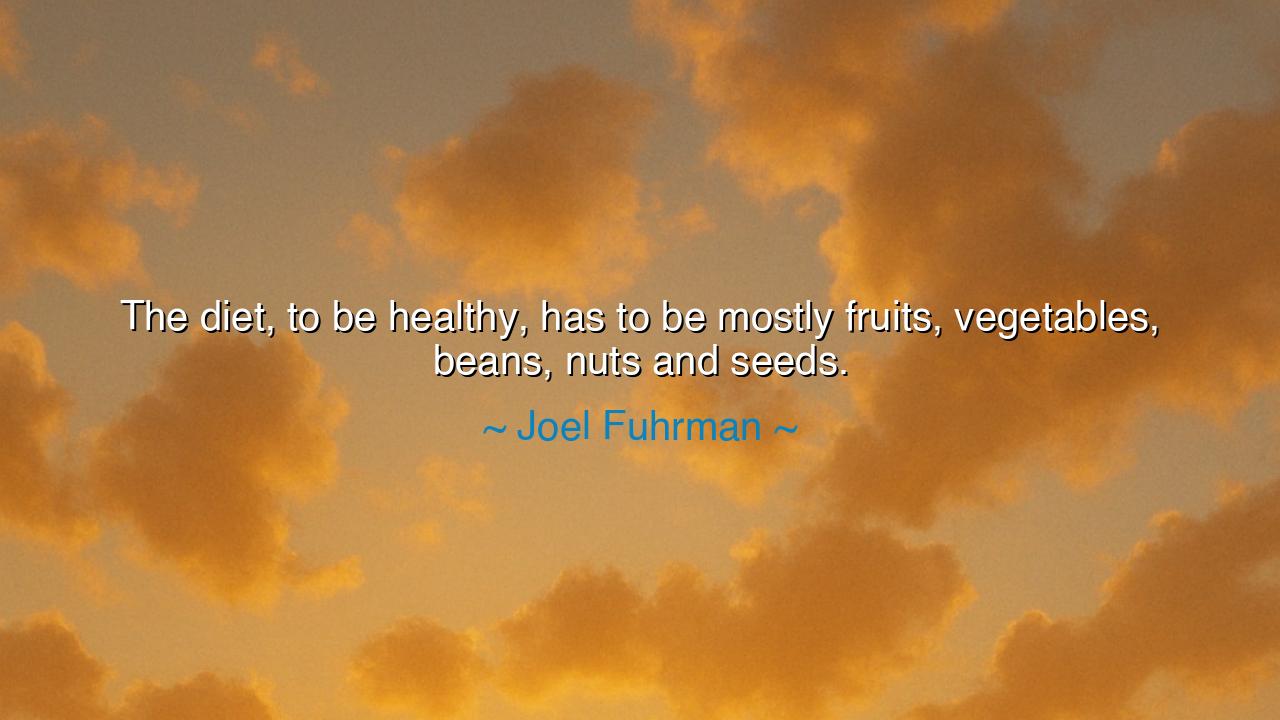
The diet, to be healthy, has to be mostly fruits, vegetables






In the vast expanse of human existence, where the body, mind, and spirit are intertwined in a sacred dance, there is an ancient wisdom that has been passed down through the ages—the wisdom of nourishment. In the words of Joel Fuhrman, "The diet, to be healthy, has to be mostly fruits, vegetables, beans, nuts, and seeds," we hear a timeless truth: that health is not merely the absence of illness, but the flourishing of the body through simple, natural foods. This statement resonates deeply with the ancient belief that the earth itself provides us with the nourishment we need, and that to live in harmony with nature, we must return to the basics of what is most sustaining and pure.
In the teachings of the ancient Greeks, particularly Hippocrates, the father of medicine, we find a deep connection between food and the health of the body. Hippocrates famously declared, "Let food be thy medicine, and medicine be thy food." For Hippocrates, diet was not simply a means of survival but a powerful tool for healing and well-being. He believed that the body’s natural ability to heal itself was fueled by whole, natural foods—foods that come from the earth in their simplest, most unrefined forms. Fuhrman’s call for a diet centered around fruits, vegetables, beans, nuts, and seeds echoes this ancient wisdom, reminding us that the key to health lies not in processed or artificial foods, but in the wholesome gifts of nature.
Consider the Romans, who, though known for their feasts and indulgence, also understood the value of simple, natural foods. Cicero, the great Roman orator and philosopher, often spoke of the importance of moderation in all things, including diet. While the Romans enjoyed rich meals, they also understood the nourishing power of grains, vegetables, and fruits. Cicero believed that the key to a long and healthy life was not in excess, but in the careful balance of foods that nurtured the body and mind. In this sense, Fuhrman’s advice to center our diet on plant-based foods reflects the Roman understanding that health is rooted in a connection to the earth’s simplest and most pure offerings.
In ancient India, the practice of Ayurveda, which has been passed down for millennia, also emphasizes the importance of a diet rooted in fruits, vegetables, and legumes. The great Ayurvedic texts, such as the Charaka Samhita, speak of food as the foundation of health, and they categorize foods based on their ability to balance the doshas—the energies that govern the body. Ayurveda teaches that to live in balance and to achieve health, one must consume foods that are fresh, whole, and natural—just as Fuhrman suggests. The Ayurvedic wisdom of nourishing the body with whole plant foods continues to be validated by modern science, as these foods are known to provide the necessary nutrients and vitality needed for a thriving life.
Fuhrman’s assertion that a healthy diet should be based on plant-based foods reminds us of the simplicity and purity that is essential for maintaining balance in the body. The medieval healing traditions, particularly in the monasteries of the Benedictines, also understood the value of simplicity in diet. The monks often ate simple meals based on grains, vegetables, and fruits, believing that excess or indulgence in rich foods would cloud the mind and body. Their focus was on a whole-food diet that supported both mental clarity and spiritual well-being. Fuhrman’s modern emphasis on whole plant foods is a return to these ancient practices—an understanding that the healthiest diet is one that provides the body with pure, unrefined sustenance.
The lesson from Fuhrman’s words is clear: to thrive physically, we must nourish our bodies with the simplest, most pure foods available. A diet centered on fruits, vegetables, beans, nuts, and seeds is not just a modern fad, but a return to the wisdom of the ancients. In our own lives, we must embrace a diet that is rooted in nature, one that honors the body’s need for balance, nourishment, and vitality. Just as the ancients recognized the importance of whole foods for healing and well-being, so too must we place these foods at the center of our lives to achieve lasting health.
In our fast-paced modern world, where processed foods often dominate the diet, it is essential that we return to the practices of the ancients and the wisdom of Fuhrman. By choosing to center our diet around plant-based foods, we reconnect with the natural rhythms of the earth, honoring both the body and the spirit. Let us choose fruits, vegetables, beans, nuts, and seeds—foods that are simple, pure, and nourishing. In doing so, we not only honor our physical health, but we also align ourselves with the timeless wisdom of those who understood that true health lies in a balance with nature, a harmony that has been passed down through generations.






AAdministratorAdministrator
Welcome, honored guests. Please leave a comment, we will respond soon